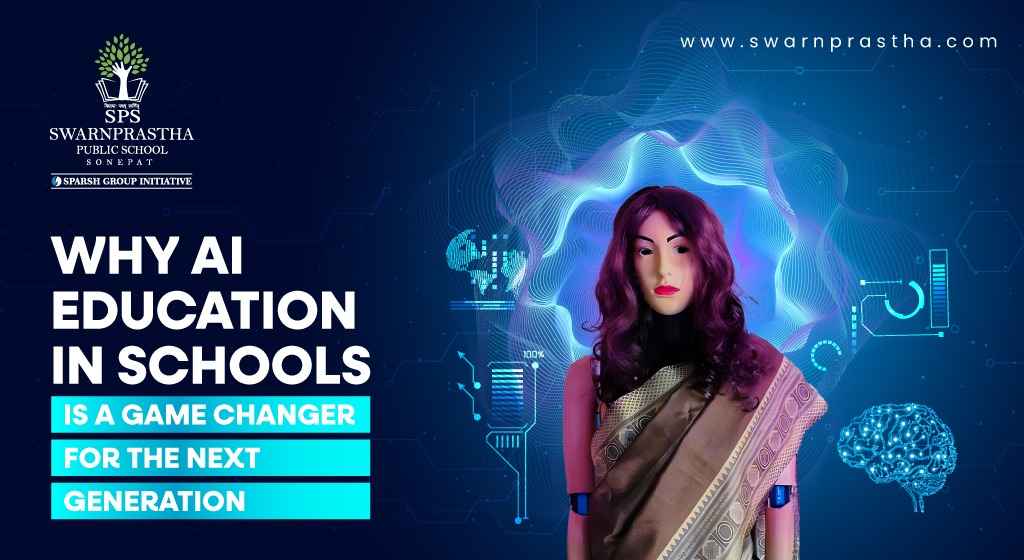The world we inhabit today is undergoing a renaissance in the way we learn and go about our work, largely owing to the advent and eventual reigning of AI. Artificial Intelligence is reshaping traditional teaching and learning experiences, revolutionising education and creating opportunities of personalised learning through Virtual Reality (VR) and Augmented Reality (AR). Today's educational institutions are responsible for integrating AI in their curriculum to enhance academic outcomes and also in preparing learners for a technology-driven future.

AI Education: A Game Changer for Learning
One of the most significant contributions of AI to education is its ability to offer personalised learning experiences. Today, AI-powered platforms facilitate the analysis of every student’s strengths, weaknesses and learning pace, which in turn assist in tailoring learning content to meet each student’s individual needs, resulting in the easier facilitation of learning concepts and a more effective understanding of them. The introduction of AI within the education sector is making learning more engaging and promoting independent learning.
The advent of AI within the education sector is making learning inclusive. Schools and educational institutes today use various tools to ensure that every learner’s learning journey is fulfilling, making the learning experience engaging. AI tools, such as speech and speech & language assistance tools, AI-powered behavioural support tools, AI-powered assistive technologies for physical disabilities and emotional and social learning support tools, are a game-changer in the field of education for learners with special needs. The beauty of these tools is that they allow inclusivity, empowering one and all to embrace education.
AI-powered intelligent tutoring systems and virtual assistants offer 24/7 support to learners throughout their learning journey. Intelligent tutoring systems provide a human-teacher-like experience, offering step-by-step guidance, explanations and solving students’ queries. AI is significantly reshaping both learning and teaching experiences, making education more personalised, efficient and interactive.
AI-Enabled Classrooms and Empowered Educators
AI education delivers two-fold benefits to support both educational staff members and students. AI analytics allows teachers to create custom curriculum and innovative educational practices by analysing all students’ educational results. The automated processes of AI help teachers direct their work into teaching students while providing guidance and instruction. School staff receive valuable help from AI report generation because the reports identify specific student misunderstandings which lead to individualised educational solutions.
AI-powered smart classrooms are rapidly evolving in the learning environment. Learning systems powered by AI have introduced interactive whiteboards together with AI-driven tests in addition to VR-AR virtual education platforms that enhance teaching methodology. AI enables medical and healthcare professionals, as well as engineering professionals, to understand complex processes through simulations, facilitating interdisciplinary cooperation through virtual study groups. Educational institutions which implement AI-assisted gamified learning methods generate interactive education spaces that improve student engagement during classes.
The development of student assessment techniques has occurred through advancements made in the field of artificial intelligence. The implementation of AI evaluations enables automatic unbiased grading that diminishes teachers' manual grading time. AI delivers objective grading, along with real-time feedback, which enables continuous student improvement, as traditional assessment methods often lack these key factors. AI-powered career guidance tools evaluate students' aptitudes alongside their interests to generate recommendations for suitable career paths, enabling them to make informed decisions about their academic and professional paths. Through automated career guidance, students can identify market direction and employment needs to choose careers which will support their future.
The Future of AI Education
AI implements a data-focused transformation that generates both operational efficiency and educational breakthroughs for the academic domain. The implementation of AI systems in educational institutions leads to the development of combined learning approaches that merge traditional classroom delivery with online education. Through AI-powered chatbots and discussion forums, students can receive instant clarification about their doubts regardless of normal school operating hours. Artificial Intelligence translation tools help students with various language backgrounds by supplying content in their primary language thus overcoming education-related language barriers.
The various advantages of AI education systems generate particular implementation challenges. Student information security requires an immediate solution to handle both privacy data issues and moral concerns. Educational facilities working with policymakers need to create regulatory standards for AI systems used in education which protect against improper implementation without creating barriers to student access. AI systems need proper training for teachers in order to effectively deploy these systems in educational settings.
Conclusion
AI educational programmes in schools bring powerful, transformative changes to the way students learn. Schools enhance education by implementing AI-driven tools, which, along with traditional learning methods, prepare students for the upcoming job market. A transformation brought upon by AI manifests in every educational area, thus establishing itself as the key driving force that will shape education for future generations. While educational improvement through AI delivers multiple benefits, it also creates obstacles related to data security risks and ethical dilemmas and hence demands improved instructor competence. Despite these concerns, the benefits of AI in education far outweigh the challenges.
Swarnprastha Public School has integrated AI technology to design an advanced education structure that acknowledges student requirements. AI at institutions produces students who are ready for the future through their acquisition of skills needed to thrive under AI-based domains. Future advancements in AI will develop an adaptable learning system which delivers innovative possibilities to students.
FAQ
1. How is AI transforming the traditional learning experience?
AI is revolutionising education by offering personalised learning experiences through adaptive AI-powered platforms. These platforms analyse individual student strengths, weaknesses and learning paces, allowing for customised learning content. Additionally, AI-powered tools such as virtual reality (VR), augmented reality (AR) and intelligent tutoring systems enhance learning by making it more interactive, engaging and efficient.


